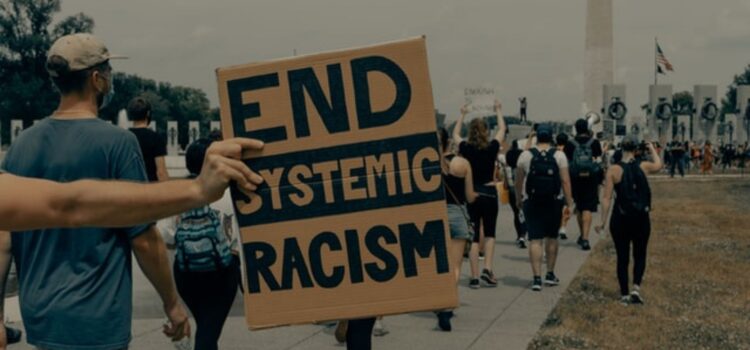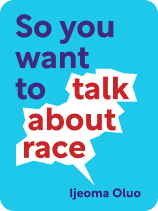

This article is an excerpt from the Shortform book guide to "So You Want to Talk About Race" by Ijeoma Oluo. Shortform has the world's best summaries and analyses of books you should be reading.
Like this article? Sign up for a free trial here .
Is there a way to end systemic racism? What can you, as an individual, do to contribute to the collective efforts to put end to racism on the institutional/systemic level?
Systemic racism is pervasive in that it permeates every aspect of the lives of people of color. To end systemic racism, we have to, first and foremost, acknowledge that racism is perpetuated on the institutional level. Because different parts of the system are propping each other up, if we pull out enough of the foundations, the whole ugly thing will collapse.
Keep reading for some ways that you can contribute to collective efforts to end systemic racism.
To End Systemic Racism, First Acknowledge It
When we acknowledge racism as systemic, it gives us many more ways to end oppression on the grounds of race. When we acknowledge racism as systemic, we illuminate those innocuous or private beliefs and emotions that feed this system. Without these usually invisible parts, the most damaging, extreme parts of the system couldn’t survive.
The system isn’t “out there” where we can’t reach it. It’s made up of the small and large decisions we all make every day. Therefore, to put an end to systemic racism, we have to closely examine which behaviors (or lack of thereof) may be feeding this white supremacist ugly system.
- Do you dismiss someone’s experience automatically?
- Do you reach out to touch someone’s hair without asking?
- Do you laugh when someone makes a racist joke?
- Do you talk about race or stay silent?
There are many ways you can contribute to the collective efforts to dismantle the white supremacist system and put an end to racism on the systemic level.
Political Actions
Vote. And not just in big elections: Vote on school boards, local elections, and so on. Local politics is often where the real change happens.
- Bother politicians before elections. Ask to see their policies on racial equality.
- Vote for candidates of color.
- Support racially inclusive and just policy platforms.
- Become involved in the campaigns of candidates of color.
Vocally support increasing the minimum wage. Proportionately more people of color work in minimum-wage jobs, so increasing the minimum wage will benefit more people of color.
Support affirmative action. Ever since the 1960s, affirmative action has aimed to increase the representation of marginalized groups in higher education and the federal workforce. The people who criticize affirmative action as “unfair” simply don’t know the facts. There have never been any quotas, and the goal representation percentages are often far below actual parity. For example, a Supreme Court decision in 1980 upheld the reservation of ten percent of funds for minority business, when the actual minority population was 17 percent. Affirmative action targets exist to redress a systemic opportunity gap. They’re not back doors or easy ways to get hired.
Approach mayors and local governments about police reform. Ask about policies regarding officer training, body cams, and complaints procedures. Demand reform wherever necessary. Keep applying pressure.
Insist on justice for police shootings. District prosecutors care about their jobs. If they risk losing their jobs because of publicity around their poor handling of police shootings, they’re more likely to follow due process.
Economic Actions
Harness the power of your wallet. Remember that economic inequalities are at the core of the White Supremacist system and do what you can to offset this.
Wherever possible, support businesses that are run by people of color. Boycott businesses that take advantage of people of color—steer clear of banks that employ racist lending practices and avoid businesses that rely on low-wage labor from people of color.
Donate to grassroots organizations that are working for change.
Offer compensation when you book a speaker of color. If you are trying to raise racial awareness in your workplace or community and want someone to come in and speak, don’t assume they’ll volunteer their time. Remember that we’re fighting against the economic exploitation of people of color, not participating in it.
Educational Actions
Engage with schools. Ask about the opportunity gap in your school district. Find out about the history curriculum. Are there any curricula and textbooks that erase people of color or teach a whitewashed version of history?
Contact teachers and educational leaders to tell them that racial issues are a priority.
If you’re at college, will soon be applying for college, or have a child in either of those situations, contact colleges to find out their policies and track record on diversity and representation.
Workplace Actions
Become active in your unions. A racially aware union can do a lot for people of color. If you speak up enough in your union over time, people will eventually start listening.
Call out tokenism. If management tries to implement perfunctory, superficial measures that look good but don’t run deep, let them know. In one of Oluo’s workplaces, for example, they conducted an employee satisfaction survey. One of the questions was about whether people of color felt they had equal opportunity with their colleagues. The results were clearly negative. But in the meeting in which they went over the survey, the director came to that slide, saw the results, and declared that people probably hadn’t understood the question before moving on to the next slide. Do all you can to prevent this from happening in your workplace.
Personal Actions
Diversify the art and music you engage with. Mainstream television, film, music, and literature is white by default. Seek out work by people of color, films in which the majority of actors are not white, and books by people of diverse backgrounds.
Watching films and reading books is a great way to listen to people of color without demanding personalized emotional labor.

———End of Preview———
Like what you just read? Read the rest of the world's best book summary and analysis of Ijeoma Oluo's "So You Want to Talk About Race" at Shortform .
Here's what you'll find in our full So You Want to Talk About Race summary :
- How to have an intelligent, empathetic conversation about race
- Why people are afraid to talk about race
- Where racism came from and what fuels it






